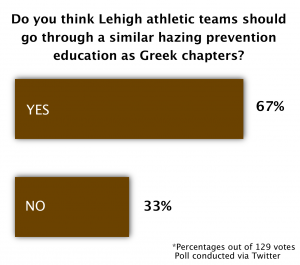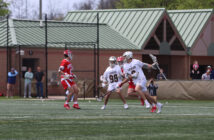Lehigh’s policy against hazing is clear: It will not be tolerated under any circumstances.
And at this time of the year, right after a new set of students have begun the pledge process to Greek chapters, it is something that is frequently spoken about.
But at a university with such prominent Greek life, students often forget that hazing has had a presence on sports teams for a long time as well.
Two thirds of 129 respondents to a Brown and White Twitter poll agree that Lehigh athletes should be required to undergo hazing prevention education similar to that of Greek chapters. Those in positions of authority at Lehigh — including staff, coaches and captains — have taken it upon themselves to try to put an end to the age of discrimination that has been so widely practiced on sports teams.
It starts at the the opening meeting of the year, which is attended by all athletes from each of Lehigh’s teams. In his 27th year as director of athletics, Joe Sterrett gave the same speech he gives every year about why anything less than equality is unacceptable.

(Created by Chris Barry & Kelly McCoy)
“Hazing is an example of something that diminishes the value and capability of teams,” Sterrett said. “So if the motivation was to have a high quality developmental participant in the program, hazing is counterproductive. It is the antithesis of team building.”
But Sterrett said he knows that an abbreviated talk can only do so much in terms of educating his teams on how to avoid problems involving hazing. He said the individual teams must find a way to instill a culture that proves to its players that things can be done the right way.
Men’s lacrosse coach Kevin Cassese is at the forefront of hazing prevention, as he does his best to make sure his team can rewrite the stereotypes of those who have come before them.
“I experienced hazing 100 percent when I was in school,” Cassese said. “And there wasn’t a lot of discussion about it. It was thought to have been done in good fun, but it wasn’t good fun for everybody.”
Cassese has been a willing participant in the movement to switch the approach taken with new members, but not everyone takes such a proactive approach. One of Lehigh’s biggest problems is that many of its athletes have already experienced hazing at the high school or club level.
“This is not something that you just decree and it’s done,” Sterrett said. “You have to continually make the effort to educate.”
Athletes are also encouraged to make a change in the program, even if they are tempted to leave things the way they are. Lehigh Athletics use a saying to encompass this idea: “If you always do what you’ve always done, you’ll always get what you’ve always gotten.”
For Cassese’s team, one of the most common examples of discrimination that they’re working to fix is the uneven delegation of duties. For example, after a road trip it’s easy to ask the freshmen to clean up. Junior midfielder Cody Triolo said that’s not the case on the lacrosse team.
Instead, the team employs a system in which all team members have to participate in tasks including cleaning the bus, collecting practice materials and managing equipment.
“We have a very talented freshman class this year,” Triolo said. “We want to emphasize that respect is earned through hard work, not age.”
In addition to stressing this message of inclusion, the team has made a point to involve its members with alternatives to nights of hazing. One of the team’s biggest events of the year is an annual date night at a volleyball match.
The thought process of the event is to allow the team to support another program. By asking each member to bring another person to the game, the team brings more than 100 people to the game to cheer on the volleyball team.
Lehigh’s softball team has taken another approach to confronting hazing. Every year, coaches update their “Lehigh Softball Matters” manual, which clearly addresses the core values of the team.
Additionally, the team makes sure to keep an open dialogue between the players and the coaching staff. A former collegiate player herself, assistant coach Michelle Prong meets regularly with the captains to make sure the culture on the team is preserved. She said the captains’ input is important to them, as it allows for an open line of communication.
This idea of communication is one that continues to be at the forefront of hazing prevention. Julia Ammary, the assistant director of athletics leadership, works with the leaders of Lehigh’s sports teams to make sure the conversation continues to progress. This process includes the facilitation of sober dialogue between team members.
“They usually don’t take the time to do that except when they’re in the wee hours of the night and maybe they’ve been drinking,” Ammary said. “We want to give them a chance to get vulnerable with one another.”
Those who work with Lehigh teams also make sure not to shy away from any sort of confrontation. Ammary and others have a very clear strategy.
“We hold up a mirror, and we’re very direct about what we’re saying even if it’s tough to hear,” Ammary said. “They need know what they’re doing.”





Comment policy
Comments posted to The Brown and White website are reviewed by a moderator before being approved. Incendiary speech or harassing language, including comments targeted at individuals, may be deemed unacceptable and not published. Spam and other soliciting will also be declined.
The Brown and White also reserves the right to not publish entirely anonymous comments.